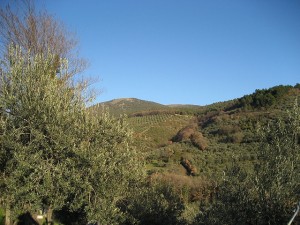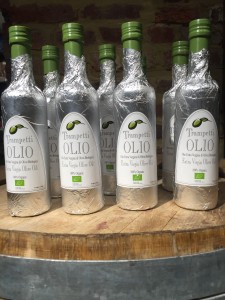In late 2015, scandal rocked the Italian olive oil industry. An anti-fraud investigation found that several major olive oil companies were passing off low-quality oil as extra virgin, and charging customers accordingly. Wondering what all the fuss is about? We sat down with visiting olive oil expert Federico Bibi of Trampetti Olio to figure out the difference between extra virgin and everything else.
“Extra virgin olive oil is mechanically extracted olive oil. There are no chemicals involved in the process,” Federico explains. “It’s very simple.” Farmers harvest the olives and bring them to a mill, where they’re pitted and smashed. The resulting pulp is processed first in a centrifuge that divides solids and liquids, and then again in another centrifuge that separates water from oil.
“If chemicals are involved in any part of this process … like, to make the oil easier to extract, or if there is heat involved … it’s not extra virgin olive oil,” Federico clarifies.
Trampetti, Federico’s small olive oil company, has done things the extra virgin way since the beginning. In 1999, while studying at university, Federico and his friend Massimo wanted to get into the food and wine industry. But wine was tricky. “Growing the vines … it’s complicated,” Federico says. “For olive oil, it’s much easier. You need olive trees, then you process the olives, and you get the oil.”

The flip side? “Earning money from olive oil … it’s really, really hard. The process is very expensive. Sixty percent of the production cost of olive oil is just about harvest,” he laughs.
Growers have several options when it comes to harvesting their crop, but not all are methods are created equal. “Basically, you can decide to pick the olives at peak harvest,” Federico elaborates. “You can do that when olives are still green, but harder to harvest, or you can wait till they are more mature, which is much easier. The same person in the same season can harvest almost double the quantity in one day just because the olives are more mature.” This route cuts production costs in half.
Even more cost-effective is the popular approach of stretching nets under the trees and waiting for the olives to fall. “That costs nothing,” Federico smiles. “But here is an example I use all the time when I do olive oil tastings: would you prefer to eat an apple straight from the tree when it’s nice and perfectly mature, or from the tree when it’s overly mature, or from the ground?”
Trampetti does things the hard way, and harvests olives at their freshest. “Our focus is to make an olive oil with the maximum amount of antioxidants,” Federico notes. This makes Trampetti olive oil healthier, and gives it a longer shelf life.

“The flavor is damaged by oxidation, so a high level of antioxidants means the flavor will stay.” With Trampetti olive oil, “whatever you get in January will be the same in June, or September.” But that’s not common among other brands. “Too often, people will buy oil that stays good for 3, 4, maybe 6 months, then loses its flavor and starts to become sweet.”
Trampetti’s product, of course, costs more than the average $7.00 bottle at the supermarket. “It’s very important to explain to people why there is such a big difference in price for different olive oils,” Federico adds. At Trampetti, quality isn’t compromised to slash retail prices.
But all this is just the tip of the olive branch. Learn more on Wednesday, February 24th at 7 pm for a guided olive oil tasting with Federico himself. See you then!

